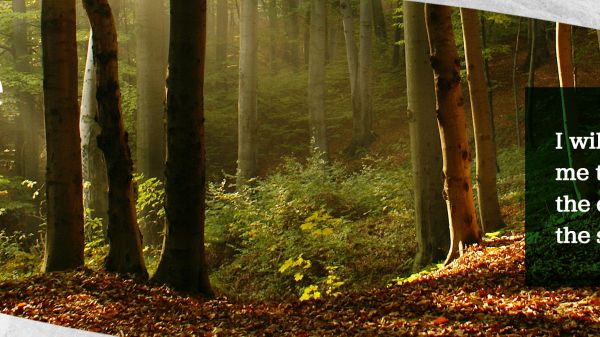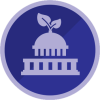Message from NAAEE ED Judy Braus, November 2020

But you have to have hope. You have to be optimistic in order to continue to move forward.
—John Lewis
Dear Friends:
As we head into the holiday season, after a year that’s merited every negative adjective from unprecedented to unprintable, it’s good to remind ourselves of the many affirming stories that have brightened our lives. From tiny heartwarming tales and new scientific discoveries to larger life lessons, there have been a host of silver linings to help us get through this difficult year. They haven’t taken away everyone’s pain and sorrow, but they have given us hope that we can use what we’ve learned to create a more positive future for us all.

- Getting Engaged: The goal of environmental education is to help people gain the skills, knowledge, and motivation to become and remain engaged in civic life. This pandemic has forced more civic engagement, notably in addressing systemic racism, climate change, hunger, poverty, discrimination, and getting out the vote. It has also raised our appreciation of people who help others, often at great risk to themselves—from health-care workers and educators to grocery store staff, cleaners, bus drivers, and so many others. We’ve seen more people planting gardens, distributing food, mentoring others, volunteering to help the sick, and giving money. And we’ve seen millions of people, including young leaders, raising their voices to fight for what they believe, from dismantling racism to combatting climate chaos. The silver lining is that so many of us have realized how fragile our social safety net is and taken responsibility for building stronger communities. We’ve also learned that the more we engage, the better we feel about ourselves and our community.
- An Owl Sparks a Smile: When the 2020 Rockefeller Center Christmas Tree, a 75-foot-tall Norway spruce, was unbundled from its long journey, the movers found, clinging to its branches, a tiny saw-whet owl.
 Now named Rockefeller, the owl is being cared for at the Ravensbeard Wildlife Center, where staff first gave him fluids and are now “feeding him all the mice he will eat.” The power of uplifting stories has never been so important, and I hope we can take joy in the stories that people share and also share those stories that help us learn and connect with others.
Now named Rockefeller, the owl is being cared for at the Ravensbeard Wildlife Center, where staff first gave him fluids and are now “feeding him all the mice he will eat.” The power of uplifting stories has never been so important, and I hope we can take joy in the stories that people share and also share those stories that help us learn and connect with others. - Is That a New Species? The adventurers and discoverers of 2020 did not let us down, with stories of new species and the importance of biodiversity. Voeltzkow’s chameleon, thought to be extinct for more than 100 years, was rediscovered in its natural habitat in NW Madagascar, in all its brilliant glory. As the researchers said, “Rediscoveries of lost species are very important because they provide critical data for conservation measures and also bring some hope amidst the biodiversity crisis.” And the chameleon was just one of a number of newly discovered species, including a brilliant flame-orange wild orchid species discovered in the Cordilleras mountain range of the Philippines, a primate living on an extinct volcano in Myanmar, two new species of gliders in Australia, and several species of marine worms that inhabit the dark depths of the Pacific Ocean. All in all, scientists estimate that more than 400 species have been discovered and described in 2020. Even in a pandemic, conservation marches on and reminds us how much we depend on the planet’s rich biodiversity for our survival.
.jpg) The Nature Connection: And speaking of nature, 2020 could be called the year of nature rediscovery. Those of us working in environmental education have long known that spending time in nature can lighten our mood, support well-being, inspire curiosity and creativity, and build caring and stewardship values that can last a lifetime. Good news! We’re not alone. We’re seeing a growing global understanding of the importance of spending time in nature and the need to ensure everyone can access these amazing benefits. We’re seeing people protecting parks, planting trees, and bringing nature back to areas that have lost it. For example, India has planted more than one million trees this year through One Tree Planted, a non-profit organization focusing on restoring fruit trees on homesteads and farmlands in India’s most vulnerable areas. These efforts help address hunger and fight climate at the same time. Worldwide, more than 15 million trees have been planted by this group alone and there are thousands of other planting efforts underway that will lead to billions of trees planted. And, we’re seeing a huge increase in using nature as a way to spark learning and caring, including an enormous rise in nature-based preschools and use of outdoor spaces as a way to re-open schools safely during this pandemic.
The Nature Connection: And speaking of nature, 2020 could be called the year of nature rediscovery. Those of us working in environmental education have long known that spending time in nature can lighten our mood, support well-being, inspire curiosity and creativity, and build caring and stewardship values that can last a lifetime. Good news! We’re not alone. We’re seeing a growing global understanding of the importance of spending time in nature and the need to ensure everyone can access these amazing benefits. We’re seeing people protecting parks, planting trees, and bringing nature back to areas that have lost it. For example, India has planted more than one million trees this year through One Tree Planted, a non-profit organization focusing on restoring fruit trees on homesteads and farmlands in India’s most vulnerable areas. These efforts help address hunger and fight climate at the same time. Worldwide, more than 15 million trees have been planted by this group alone and there are thousands of other planting efforts underway that will lead to billions of trees planted. And, we’re seeing a huge increase in using nature as a way to spark learning and caring, including an enormous rise in nature-based preschools and use of outdoor spaces as a way to re-open schools safely during this pandemic.- You’re on Mute: We will remember 2020 as the year that technology became a critical component of learning. It also reminded us of the extreme inequities in education. The good news is that many are now working to provide greater access to high-quality education and leveling up equity in technology. From WiFi hot spots in communities to providing free laptops for students, more people in all aspects of society—from nonprofits to tech companies to local government—are working to ensure that everyone has access to technology and learning. We have seen a burst of creativity in developing virtual place-based learning opportunities and have grown in our understanding that, while some learners thrive with remote learning, others need much more support. We’re realizing how important low-tech tools can be in many parts of the world, such as using cell phones and WhatsApp to reach more learners. We’ve also witnessed the surprising power of virtual conferences and other online events, and how much we’ve learned (and still need to learn) about the potential of technology to change how we educate and engage.
- The Power of Science and Critical Thinking: When we first learned about the pandemic, people looked to scientists, doctors, and other researchers to help us find a way out. And they delivered. Collaboration and science led to protection against the virus spread, innovative treatments, and now vaccines—all at record speed. As environmental educators, we champion the importance of science and critical thinking, and this year is a lesson about how important and intertwined both are. We not only depend on science to inform policy, but we also depend on critical thinking to understand complex issues and help us figure out our next steps.
These are just a few of the silver linings from a year like no other. The pandemic has forced us to slow down, speed up, reflect, and recommit to what we care deeply about. It’s shown us that we can change—from drastically reducing our carbon footprint to inspiring us to collaborate more, listen more, and do better at finding common ground. David Mathews, the head of the Kettering Foundation, wrote in an op-ed in USA Today that “to solve really difficult problems, people realize that they have to work with others who may be different.” This year has shown us that kindness matters. I hope that 2021 will be the year of listening and learning from each other, and a year of civic engagement like we’ve never seen before. No one wanted a pandemic. But the silver linings are what we’ve learned about ourselves, our communities, and our future.
 We’d love to hear about the silver linings you’ve discovered and some of the positive stories that have made you smile. Share your stories in the comments below this post!
We’d love to hear about the silver linings you’ve discovered and some of the positive stories that have made you smile. Share your stories in the comments below this post!
Happy holidays to all of you and thanks for all you do to build a better and more equitable and sustainable future. And please stay safe!
Judy Braus
Executive Director
Try to be a rainbow in someone else's cloud.
—Maya Angelou














Comments
I'm more appreciative than ever of my colleagues, and how we have supported each other professionally and personally during this crazy time. On most days, my son will make a cameo appearance on zoom to say hi. And each time he gets smiles and waves from everyone. I have so appreciated how welcoming and kind-hearted everyone has been. And I will say that even beyond the kindness, he's becoming an outspoken environmentalist himself!
My silver linings this past month feature stories from friends, family, and nature. I appreciated hearing stories from neighbors about the pesky ravens that stole 3 sticks of unattended butter and about my neighbor's young husky that howled and chased after its shadow. I loved hearing from my family that they were safe and enjoying time at home and that their chihuahua wasn't tiring of the extra attention. And, I'm grateful for every bit of sunlight that pokes through Alaska's winter skies during walks, and I'm also thankful every time I witness a hardy bird thriving in winter, like the dipper I saw the other day splashing around in a shallow stream.
I'm learning to appreciate the biodiversity in the environment around my apartment complex and within our city parks more. In the stillness of the limitations, we are observing more and appreciating what nature has always been around—and maybe even taken for granted—with fresh eyes.
My silver lining is seeing the innovation and adaptations that everyone is constantly striving for. Even with all of the challenges, uncertainties, and this long season, amazing things are happening. Progress, no matter how small, is still progress and the grace along the way is refreshing during the challenging moments.